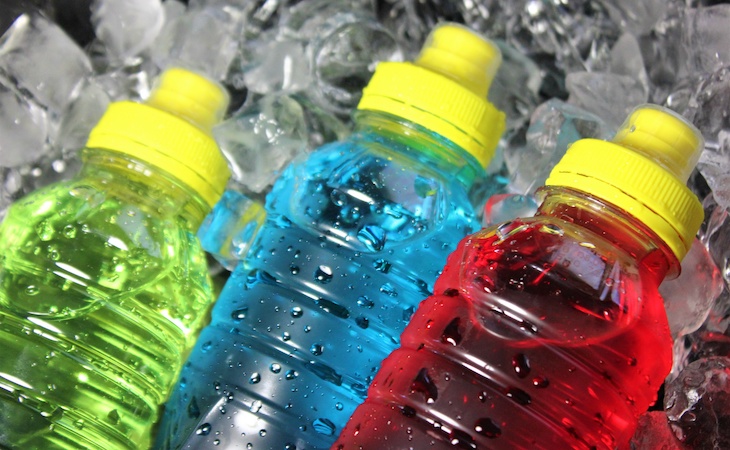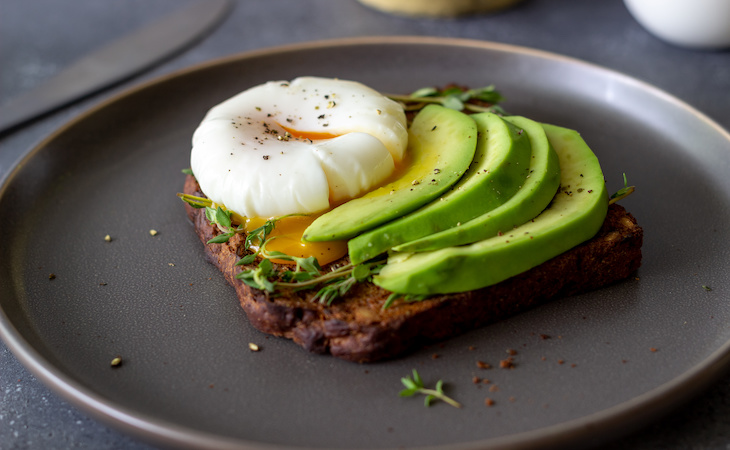Now, more than ever, electrolytes are super buzzy—and for very good reason. Electrolytes are important for overall health, especially if you’re active or find yourself sick battling the common cold or flu.
If you’ve ever found yourself wondering about electrolytes and sleep, electrolytes and sleep problems, or even asking yourself questions like, “Can electrolyte imbalance cause sleep problems” or “Do electrolytes help you sleep,” then you’ve come to the right place.
Here’s everything you should know about electrolytes and sleep.
What are electrolytes?
Electrolytes are minerals that have an electrical charge to help transmit nerve impulses throughout the body. Some of the main electrolytes are magnesium, potassium, and sodium. Others include bicarbonate, calcium, chloride, and phosphate. [1]
Where can you find electrolytes?
Electrolytes can be found in many of the foods you eat. These include foods that contain some of the most common electrolytes like calcium, chloride, magnesium, and potassium.
For example, calcium-based foods include beans, certain fruits and vegetables (e.g., asparagus, collard greens, dried apricots, and figs), eggs, fish with bones (e.g., sardines), fortified breakfast cereals, meat, milk, and milk products like yogurt. [2]
Foods that are naturally rich in chloride, meanwhile, include celery, lettuce, olives, rye, tomatoes, seaweed, and table salt. [3, 4] You can also find the electrolyte magnesium in a variety of foods like avocado, dried beans, leafy greens (e.g., collard greens, spinach, and turnip greens), legumes, lentils, nuts, peanut butter, seeds, and whole grains. [5, 6]
Finally, electrolytes can be found in foods that contain potassium such as avocados, bananas, beans, Brussels sprouts, broccoli, cabbage, coconut water, cooked spinach, leafy greens, legumes, melons, oranges, peas, plain nonfat yogurt, prunes, raisins, stone fruits (e.g., apricots and dates) sweet potatoes, tomatoes, and watermelon. [7, 8, 9, 10]
If none of these foods happen to be on your weekly grocery list, you can also opt for an electrolyte-infused sports beverage or supplement as many varieties carry a number of electrolytes that are especially lost during vigorous activities like exercise, sports, and workouts.
What are the benefits of electrolytes?
Electrolytes are commonly perceived as a go-to source for hydration, especially during physical activities like workouts at the gym. This is because electrolytes can help to replenish fluid and other electrolytes that have been lost during prolonged periods of intense training. [11]
However, there are a few other times when you may need more electrolytes, including during an illness or after a night of drinking too much alcohol. [12]
Electrolytes are essential for your cells and organs to function properly. They balance the amount of water in your body and control your pH levels. According to Rush University, these electrically-charged minerals help regulate everything in the body from hydration to muscle function to the nervous system. [13]
This includes the most important muscle of all—the heart. “Electrolytes enable the electrical impulses to be generated normally within the heart, so your heart can contract and relax at a normal rate,” notes Rush University. [13]
The bottom line when it comes to electrolyte benefits is that they control fluid balance, help muscles (including the heart) contract, maintain the correct acidity of the blood (e.g., pH levels), and regulate blood pressure. [1, 14] All important items for helping the human body function at its best.
Can electrolyte imbalance cause sleep problems?
What about electrolytes and sleep? Can an electrolyte imbalance cause sleep problems—and do electrolytes help you sleep? Basically, can electrolytes and sleep problems go together hand-in-hand?
“Electrolyte and vitamin imbalances can create sleep issues,” said Mark Healey and Tim Duba, the founders of Protekt, a brand that offers a variety of wellness products, including an electrolyte supplement and sleep supplement. Healey and Duba add that this is specifically the case for magnesium and potassium.
While not an electrolyte itself, the pair also notes that a lack of vitamin D can cause sleep problems too. According to the Cleveland Clinic, the so-called sun vitamin can affect your electrolyte levels. [15]
“This is because vitamin D is directly related to electrolytes,” Tamanna Singh, MD, tells the Cleveland Clinic. “It helps the body absorb calcium, and transports magnesium across the body.”
Do electrolytes help you sleep?
So, back to electrolytes and sleep. Are electrolytes good for sleep—and how can they improve sleep so you experience fewer disturbances?
Electrolyte imbalances can interfere with the quality of your sleep. For example, low sodium levels have been linked to restlessness and difficulty sleeping, while calcium, which helps the body regulate slow-wave or deep sleep, may contribute to sleep disruption if it’s too low in the body. This is why yes, electrolytes are good for sleep. [16, 17]
How to use electrolytes to improve your sleep
If you’re interested in electrolytes and sleep or possibly using electrolytes for sleep disturbances or even electrolytes to treat sleep problems, choose an electrolyte beverage or supplement from a reputable brand.
One such option is HYDRATION by Protekt. According to the brand founders, it contains a 10:2:1 electrolyte ratio, which includes 500 mg of sodium chloride, 100 mg of potassium citrate, and 50 mg of magnesium citrate.
“In a liquid format, our supplements absorb 20 times faster than powders with 90% ingredient absorption,” note Healey and Duba. “You’re getting a rapid delivery and powerful dosage of ingredients. Potassium and magnesium citrate have both been proven to correct potassium imbalances better than other forms of potassium alone. [18] Magnesium citrate is the most bioavailable form of magnesium as it is 16% elemental magnesium.”
If you decide to add an electrolyte supplement to your routine, be sure to read all instructions and consume the electrolytes at the proper time of day if stated. For example, to use HYDRATION, the brand recommends adding one liquid supplement packet to 16 ounces of water and drinking. You don’t have to mix or shake, and you can use one to two packets daily or as needed.
(By the way, Protekt also offers a sleep aid called REST, which contains sleep-enhancing ingredients like valerian root extract and l-theanine.)
FAQs
Do electrolytes affect sleep?
Electrolyte imbalances can interfere with the quality of your sleep. For example, low sodium levels have been linked to restlessness and difficulty sleeping, while calcium, which helps the body regulate slow-wave or deep sleep, may contribute to sleep disruption if it’s too low in the body.
Are electrolytes good before bed?
Electrolytes before bed can help provide the body with everything it needs for a restful night’s sleep. That means more sleep with fewer disturbances and wake-up calls in the middle of the night.
Can electrolytes keep you up at night?
Electrolytes shouldn’t keep you up at night. Unlike other things like alcohol or caffeine, electrolytes aren’t a stimulus and therefore shouldn’t keep you awake.
Can low electrolytes cause sleepiness?
Low electrolytes may cause fatigue, which also may essentially make you feel sleepy and tired. [19]
What other vitamins and minerals are key to a good night’s sleep? Here are the top nutrients that can affect your ability to snooze.
References
- Cleveland Clinic. Electrolytes. https://my.clevelandclinic.org/health/diagnostics/21790-electrolytes
- International Osteoporosis Foundation. Calcium Content of Common Foods. https://www.osteoporosis.foundation/patients/prevention/calcium-content-of-common-foods
- Mount Sinai. Chloride in diet. https://www.mountsinai.org/health-library/nutrition/chloride-in-diet.
- Harvard School of Public Health. Chloride. https://nutritionsource.hsph.harvard.edu/chloride/
- Cleveland Clinic. Magnesium Rich Food. https://my.clevelandclinic.org/health/articles/15650-magnesium-rich-food
- National Institutes of Health. Magnesium. https://ods.od.nih.gov/factsheets/Magnesium-HealthProfessional/
- Cleveland Clinic. Beyond Bananas: 16 Potassium-Rich Foods. https://health.clevelandclinic.org/potassium-rich-foods
- UptoDate. Patient education: Low-potassium diet (Beyond the Basics). https://www.uptodate.com/contents/low-potassium-diet-beyond-the-basics/print
- National Kidney Foundation. Potassium in Your CKD Diet. https://www.kidney.org/atoz/content/potassium-ckd-diet
- Mayo Clinic. What is coconut water and what’s behind the hype? https://www.mayoclinic.org/healthy-lifestyle/nutrition-and-healthy-eating/expert-answers/coconut-water/faq-20207812
- Cleveland Clinic. Dehydration. https://www.mayoclinic.org/healthy-lifestyle/nutrition-and-healthy-eating/expert-answers/coconut-water/faq-20207812
- Cedars Sinai. What are Electrolytes? https://www.cedars-sinai.org/blog/electrolytes.html
- Rush University. Essential Electrolytes. https://www.rush.edu/news/essential-electrolytes
- Centers for Disease Control and Prevention. Effects of Sodium and Potassium. https://www.cdc.gov/salt/sodium-potassium-health/index.html
- Cleveland Clinic. How Supplements Affect Heart Palpitations. https://health.clevelandclinic.org/heart-palpitations-and-supplements
- StatPearls. Electrolytes. https://www.ncbi.nlm.nih.gov/books/NBK541123/
- Jeon, Y. S., Yu, S., Kim, C., Lee, H. J., Yoon, I. Y., & Kim, T. (2022). Lower Serum Calcium Levels Associated with Disrupted Sleep and Rest-Activity Rhythm in Shift Workers. Nutrients, 14(15), 3021. https://doi.org/10.3390/nu14153021
- Wuermser, LA, Reilly, C., Poindexter, JR, Sakhaee, K, Pak, C. (2000). Potassium-magnesium citrate versus potassium chloride in thiazide-induced hypokalemia. Kidney International 50(2) 607-612. https://www.sciencedirect.com/science/article/pii/S0085253815467778
- Cleveland Clinic. Electrolyte Imbalance. https://my.clevelandclinic.org/health/symptoms/24019-electrolyte-imbalance




